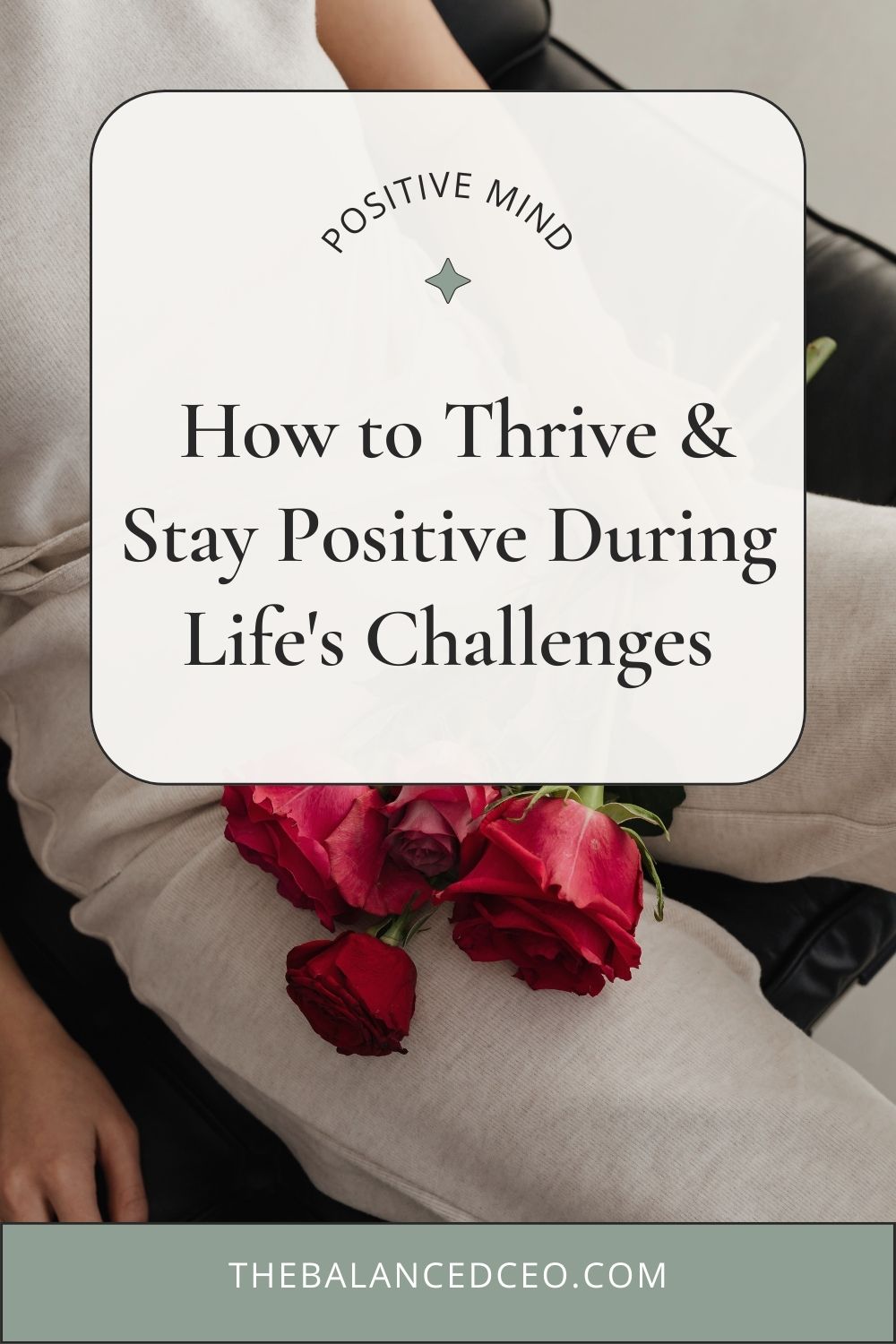This post may contain affiliate links, which means I’ll receive a commission if you purchase through my links, at no extra cost to you. Please read full disclosure for more information.

Most people would agree that life can be very hard. Those who would earnestly disagree with this would probably agree later on down the road, because tough situations and unforeseen difficulties come for us all, sooner or later.
This is just a reality of life, and it’s worth accepting and understanding so we can deftly navigate our way through those periods without feeling bitter, or prolonging the hardship unnecessarily. However, it’s also true to say that part of maturing and living a good life is about understanding the bad and overcoming it, as opposed to just ignoring it.
For example, we might lose a parent that we absolutely love, and that can be tremendously hard to deal with, but that never cancels out the wonderful memories, connection, and genuine love we shared. Some people suggest that those who see the hardships of life as a main reality are more focused and realistic, but the truth is that an optimist can be just as realistic as anyone else.
If you find yourself hyper-focusing on the negative in life (even though doing so is sometimes understandable), know that your perspective is only half-complete. Without the good, helpful, and heartfelt side of life, no perspective is truthful.
In this post, we hope to provide a helpful, realistic guide to overcoming thought spirals or a sense.
Tips to Stay Positive During Hard Moments in Life
Accept & Understand Your Very Real Challenges
Of course, it’s very easy for a guide like this to fall into platitudes, and for people going through genuinely difficult circumstances, this doesn’t particularly help. For that reason, we hope to be focused on the very real challenges you face first and foremost. We get there by first accepting them.
However, remember that accepting them means defining them. When you define them, you understand them. This means that problems and difficulty feel less like a dark cloud you’re lost in, and instead a series of defined challenges that may possibly offer a foothold for you to move through them. So for example, if you find that you’re suffering from PTSD or other traumatic difficulties and are self-medicating, understanding your negative behaviors by viewing them uncritically and without judgment is key.
Perhaps this can inspire you to take that first step towards a VA inpatient rehab, or simply telling your friend that you’ve been struggling and you need help. The feeling you get when an issue that’s been plaguing you is visible, and even tangibly solvable (with enough effort), is tantamount to incredible relief.
Don’t Assume You’re Bigger Than Life
A good way to cause yourself unnecessary suffering is to experience difficulty, but feel like you should be unaffected. For example, those who try to quash their very real emotions because they don’t think they should have them, perhaps keeping a stiff upper lip at a funeral, is only causing themselves harm by fighting their natural reaction.
While it’s true we can process our emotions privately and with dignity, it’s important not to block ourselves off completely. When life is hard, our bodies and minds have means of processing those events, which can help us move on with clarity and care. For example, if you feel numb after a loved one passes, this is quite normal, and you shouldn’t force the timeline of your emotions.
Not being afraid to feel vulnerable, sad, and unhappy is one of the most powerful lessons you can learn, because it shows you’re not afraid to be little, which ironically helps you become stronger, but more authentically this time around.
That might sound like some reverse psychology, but it’s really very simple in practice. If you can be weak, then you won’t feel ashamed, or think you should be much, much stronger than you are, as if someone could be stronger than life itself. Sure, there may be some wisdom in philosophies like stoicism, but ultimately nothing compares to accepting your natural feelings and letting yourself process tough emotions. They’re here for a reason.
Find Joy In The Little Things
You don’t need designer clothing, the nicest cars, the largest house or the most successful career to enjoy happiness in life. Those things can be nice, sure, but they’re luxuries, not the necessities.
Moreover, if you can’t find joy in the little things, then those expensive items are rarely going to satisfy you. You might consider focusing on the little things and seeing the love and joy in them to be the real goal of life. In fact, most of us are so focused on our daily work, tasks, and responsibilities we can delay looking at what’s entirely in front of us.
It might be that the school run is stressful, but hearing your children laugh hard in the car about a silly topic they’re discussing can put a smile on your face, too. Going for a walk in nature with your dog can help you feel great thanks to the beautiful surroundings and blooming flowers, especially in the springtime. Maybe you enjoyed a lovely coffee in your garden this morning and felt at peace.
Finding joy in the little things is one of the best bulwarks against the hardships of life because there are many, many more little beautiful events than there are tough difficulties you have to chart through. Even during tough times in your life, you can still enjoy the beauty of cooking a simple meal, sharing a laugh with a friend, enjoying a great sleep, and connecting with a loved one. Keeping that in mind can help you avoid hyperfixating on the toughness, and enjoy levity when you really need it.
Take It Easy
In our hypercompetitive and productive culture, it’s easy to assume that if we’re not working 11-hour days, working on personal projects, constantly investing in our professional scope, and developing our own enterprises we’re just not working hard enough.
Of course, you might have certain goals that fulfill you, like taking night classes for a language, writing a novel or volunteering for a work placement. However, it’s also true that there’s virtue in taking it easy when you really need to, and letting yourself rest.
This is especially true during tough periods. Sometimes, nailing your sleep schedule can be the most worthwhile investment you could make, improving your mental and physical health drastically and dissolving your stress levels.
The same goes for focusing on other lifetime challenges. If you’ve become a little concerned that you’re drinking too much, you might mention this to a friend, suggest other activities for a weekend, and perhaps start a new hobby with them like a hobbyist class, gym attendance, or simply spending more time at home in the evenings.
Taking things easy gives you the chance to relax when you need it, without burning the candle at both ends. Sometimes, that’s what you need to recover and restore, and there’s absolutely nothing wrong with prioritizing that style of living for a time.
Make Reading Part Of Your Schedule
It might seem like an odd suggestion – what does the latest sci-fi novel provide you when you’re dealing with real-life troubles?
Well, it’s important to think of stories as more than just escapism. Not only is it a means of helping restore your brain’s natural capacity for language and legibility which can be a breath of fresh air in an emotional storm, but some of the greatest minds have written about the human condition for centuries.
You might find more parallels to your current life circumstances than you would expect, even in classical novels dating back quite some time. Realizing that your difficulties are in no way unique and that other people totally understand is helpful. A good book can help people change their lives, their outlook, their gratitude, their willingness to try again, and more.
Moreover, reading inspires you to sit down, take it easy, and look out to something more than yourself. It can be inspirational and comforting at the same time. It can also provide a sense of comfort and escape when you need it, even if you only read a chapter a day.
Communicate & Talk
A problem shared is a problem halved, and you don’t have to stoically move through every challenge without talking about it. That might look cool in cinema, but in real life, that’s a great way to bottle up your emotions until they explode.
You might not always think of talking, but when you can, be sure to do so. Confiding in a friend, a therapist, or a doctor can be a wonderful step forward. For example, if you’re suffering from depression after giving birth, don’t just ignore it, ask for help.
Not only does this show real courage in getting out there and asking for assistance, but it can help you resolve an issue much more quickly than you would otherwise. Often, being able to talk and share your feelings can have a comforting effect, because instead of a storm inside your mind you’ve structured those feelings into sentences, which make them more definable and understandable.
So, if this post inspires you to do anything, be sure to talk more. It’s not conceited to explain or discuss your own situation, it might just give someone else that sense of authentic connection they’ve been looking for.
With this advice, we hope you can more easily thrive and stay positive during life’s challenges.





Leave a Reply